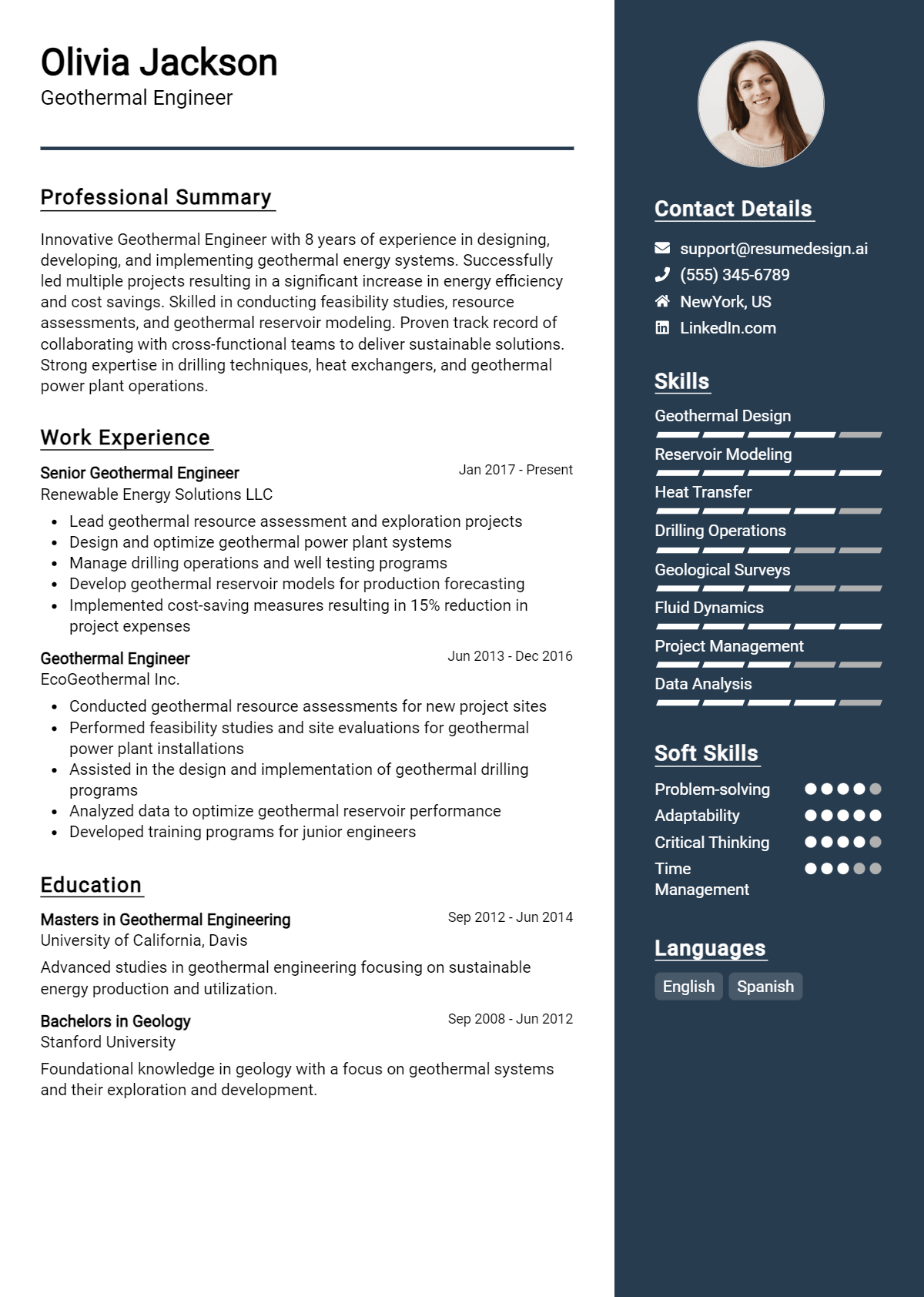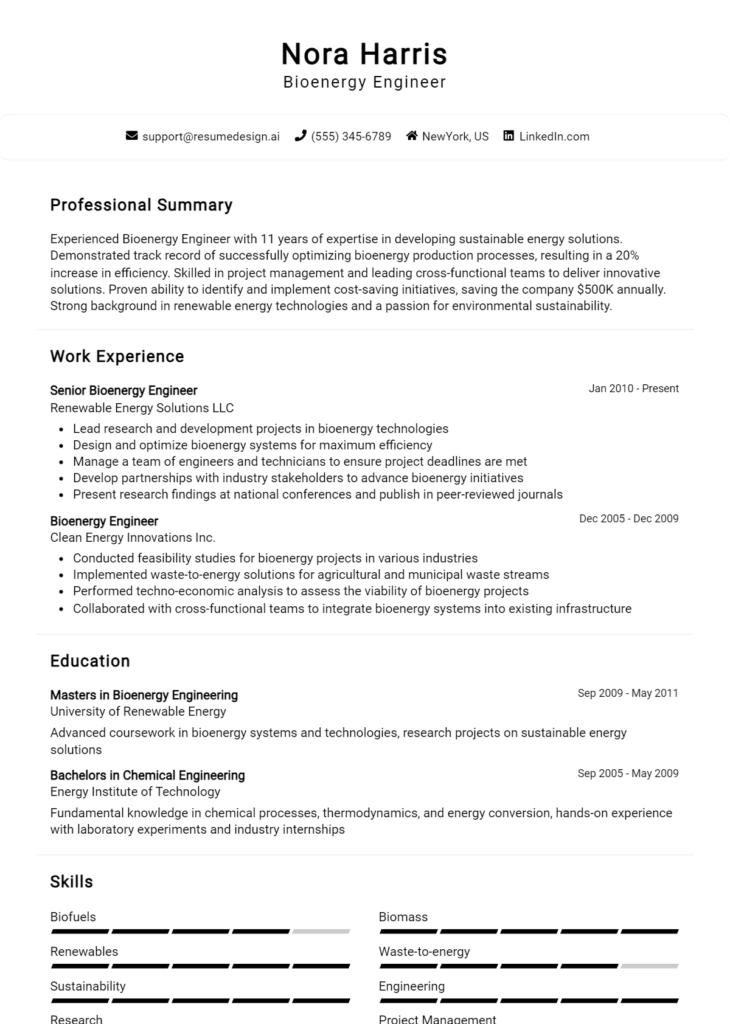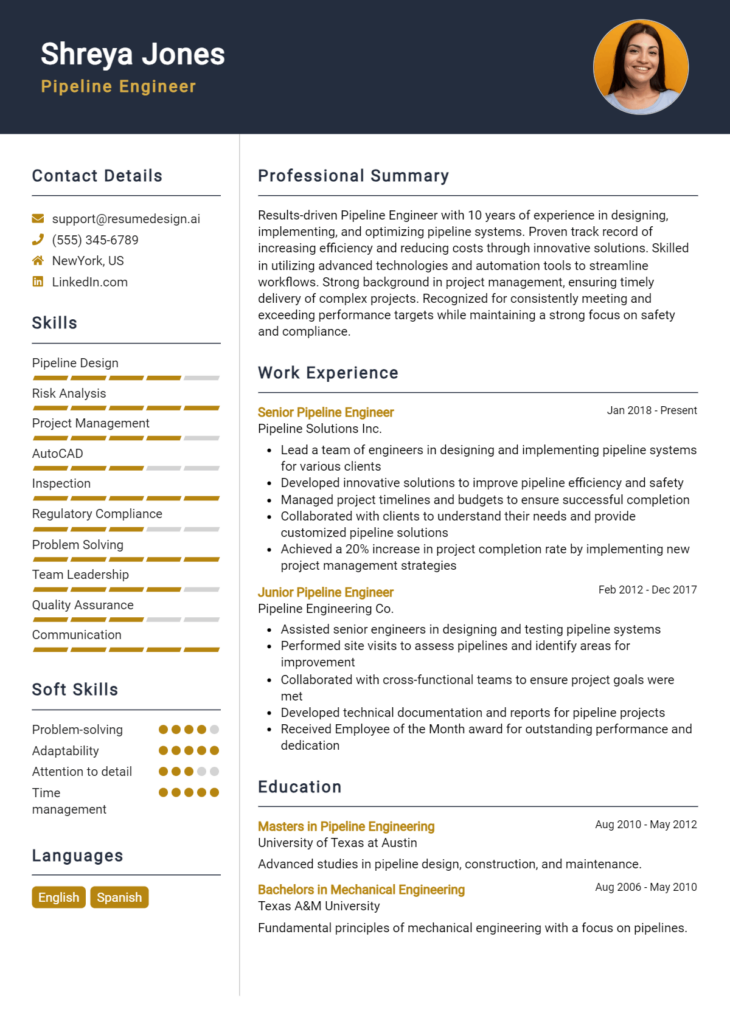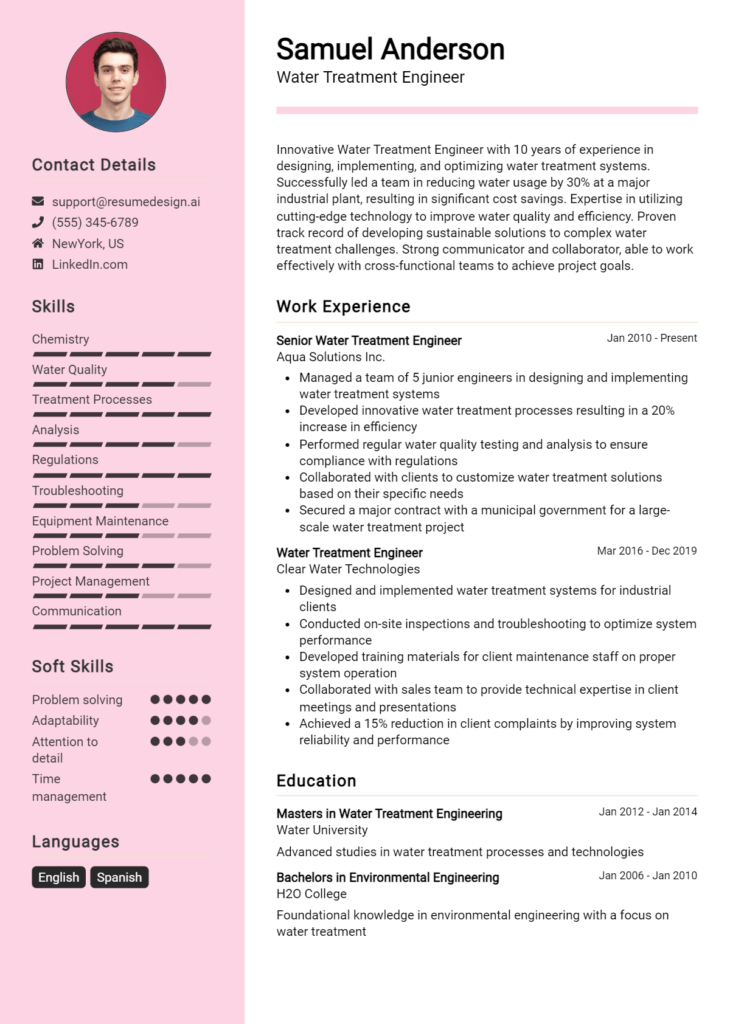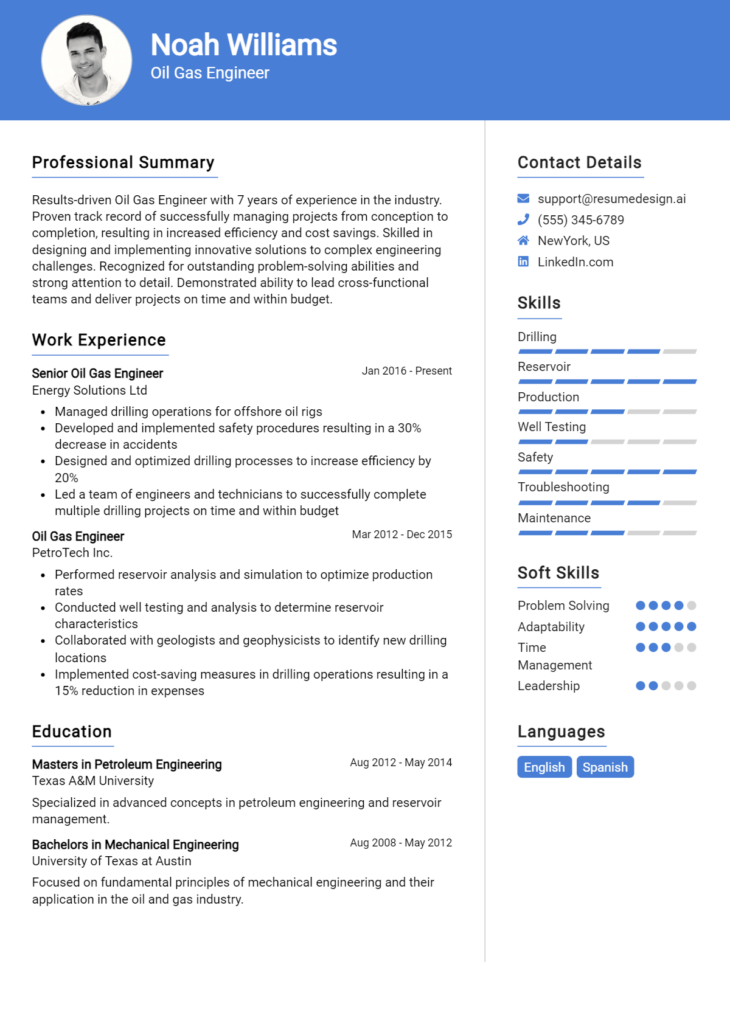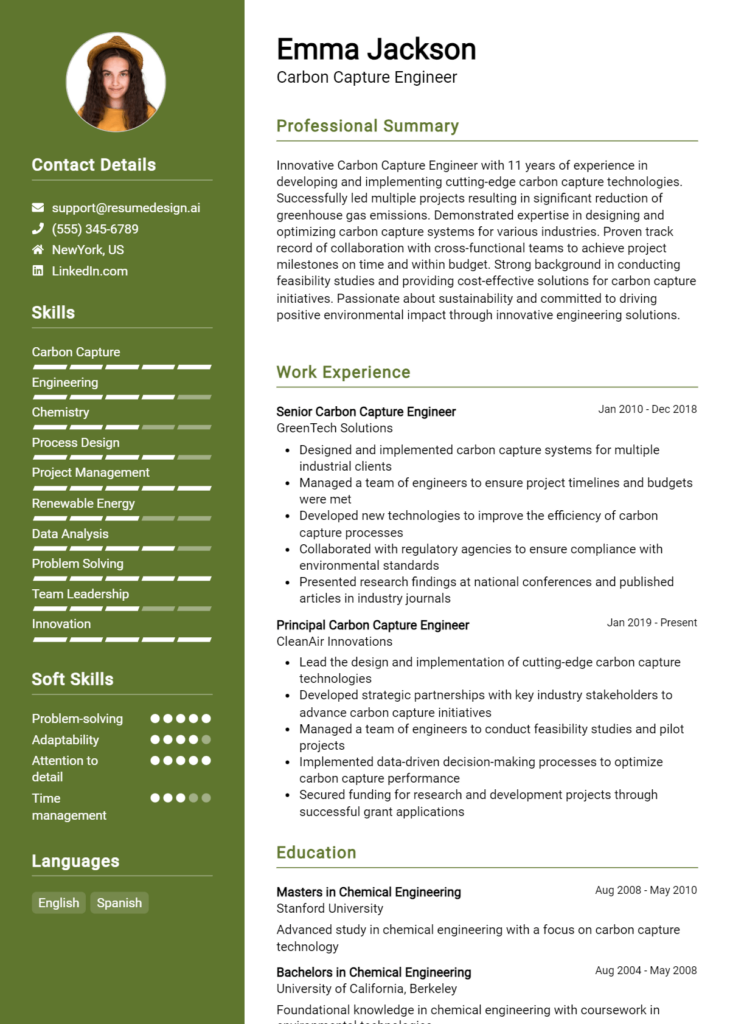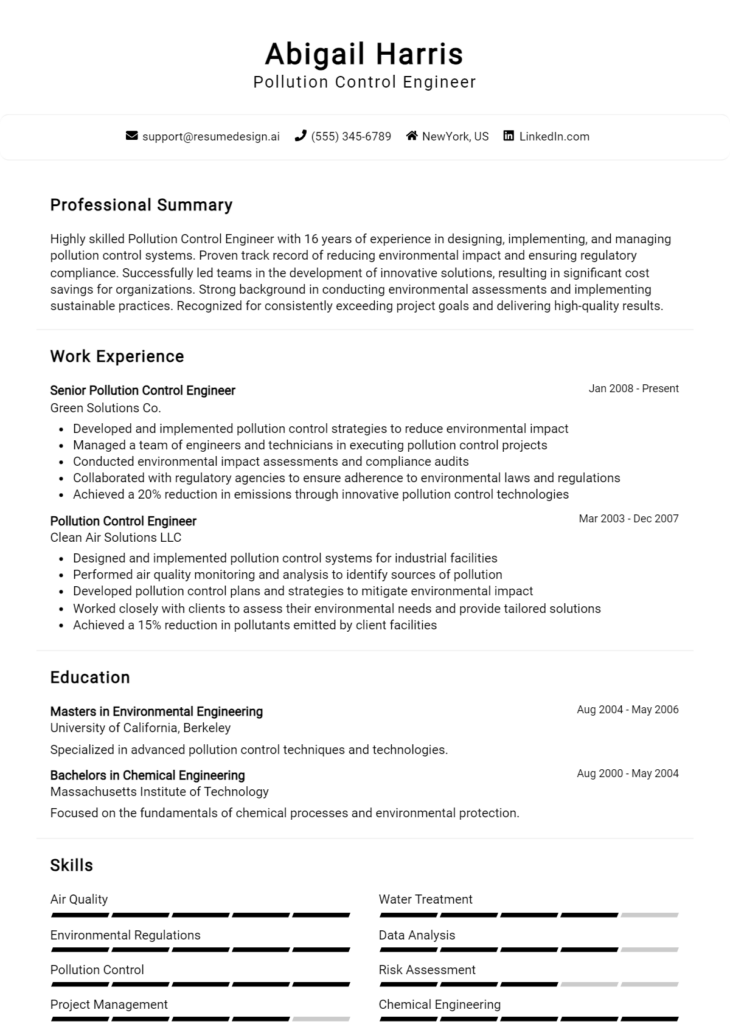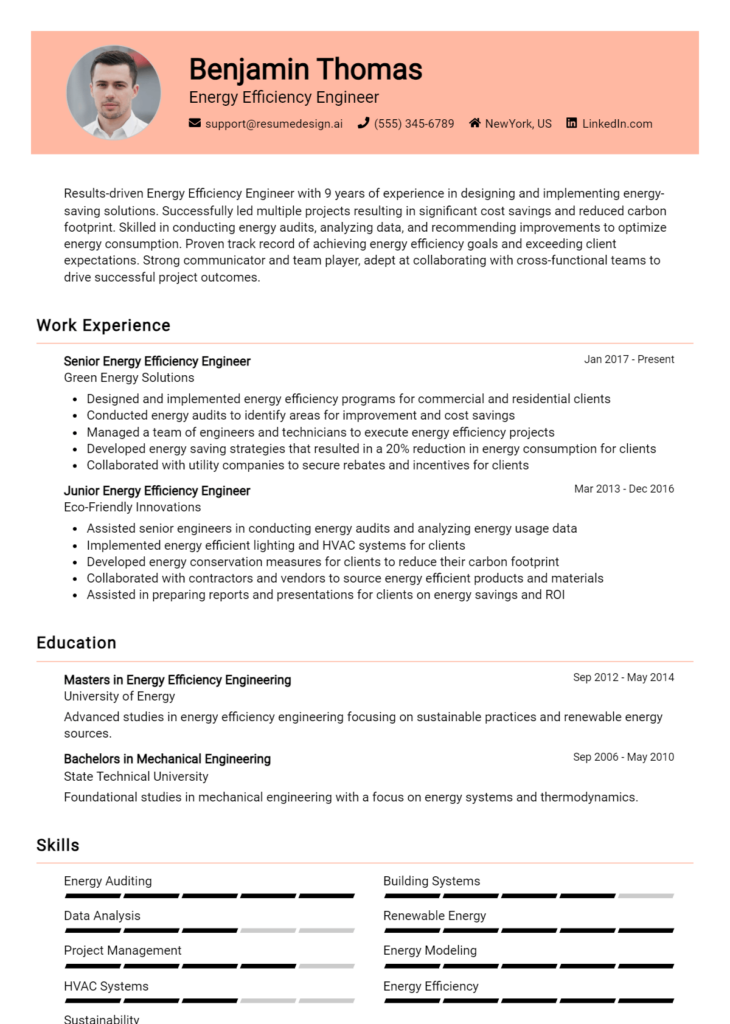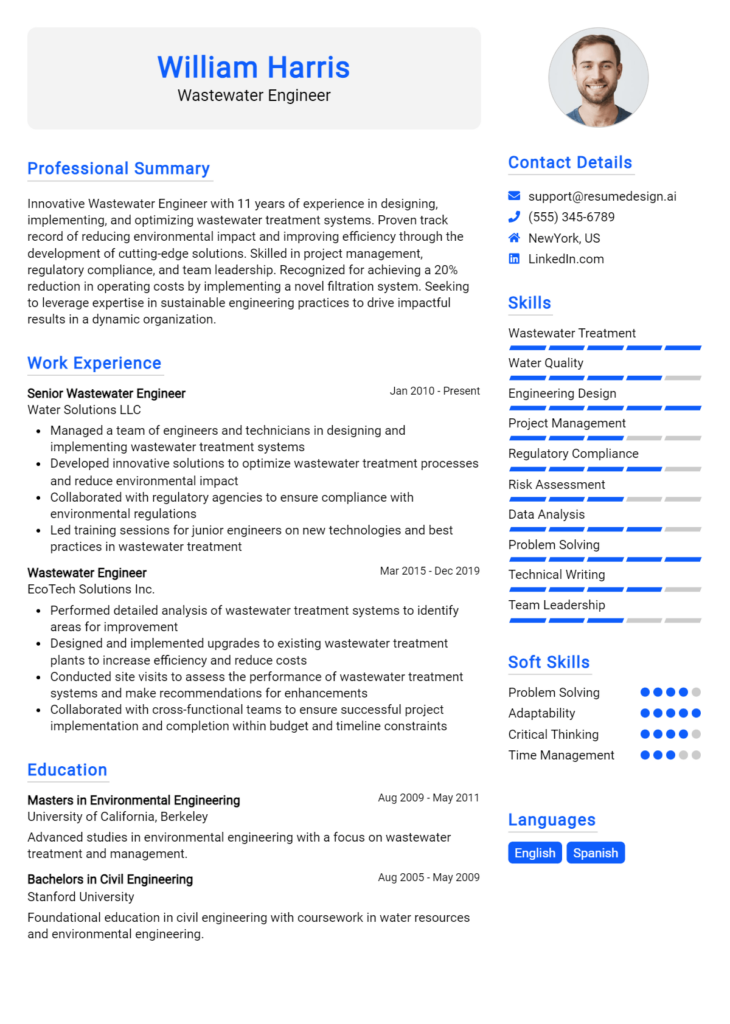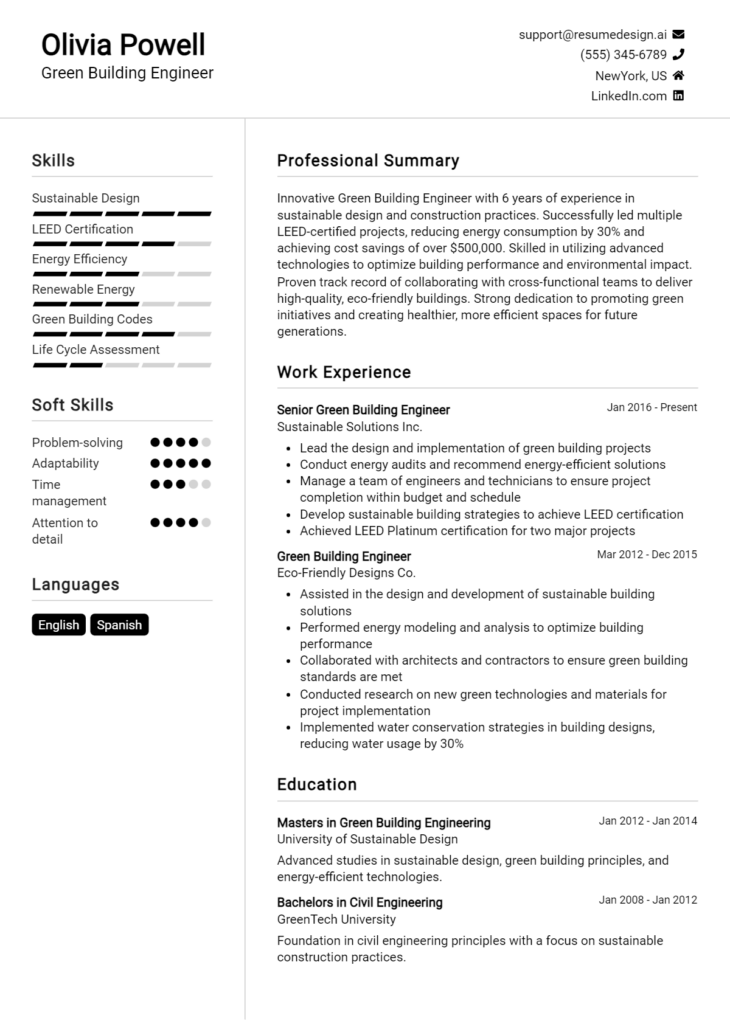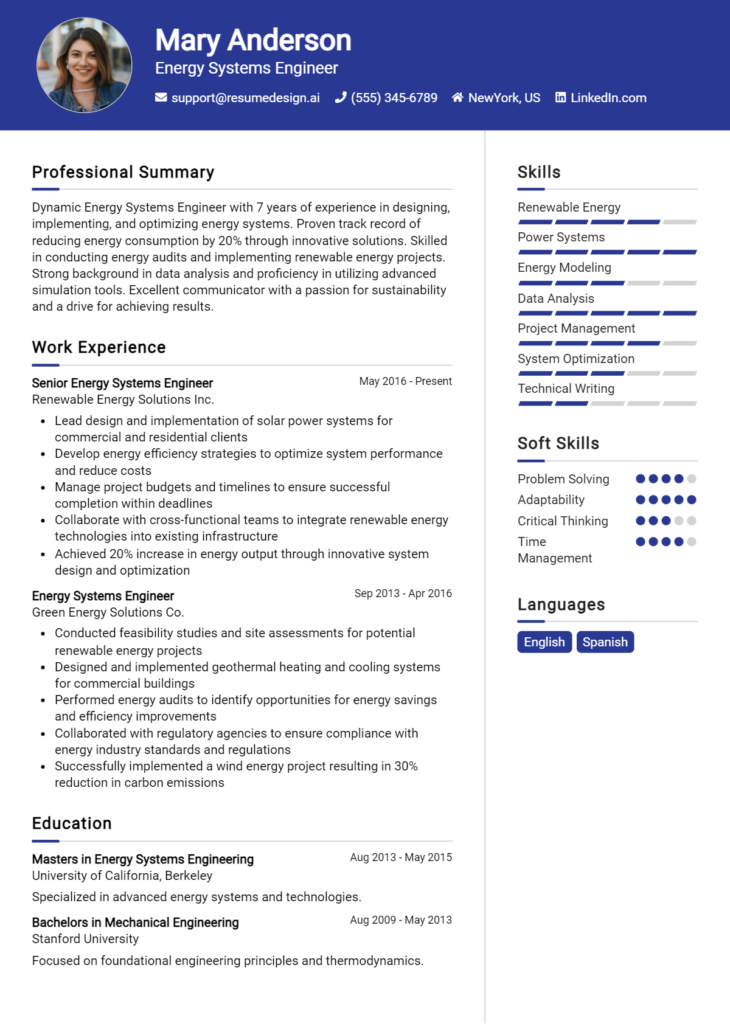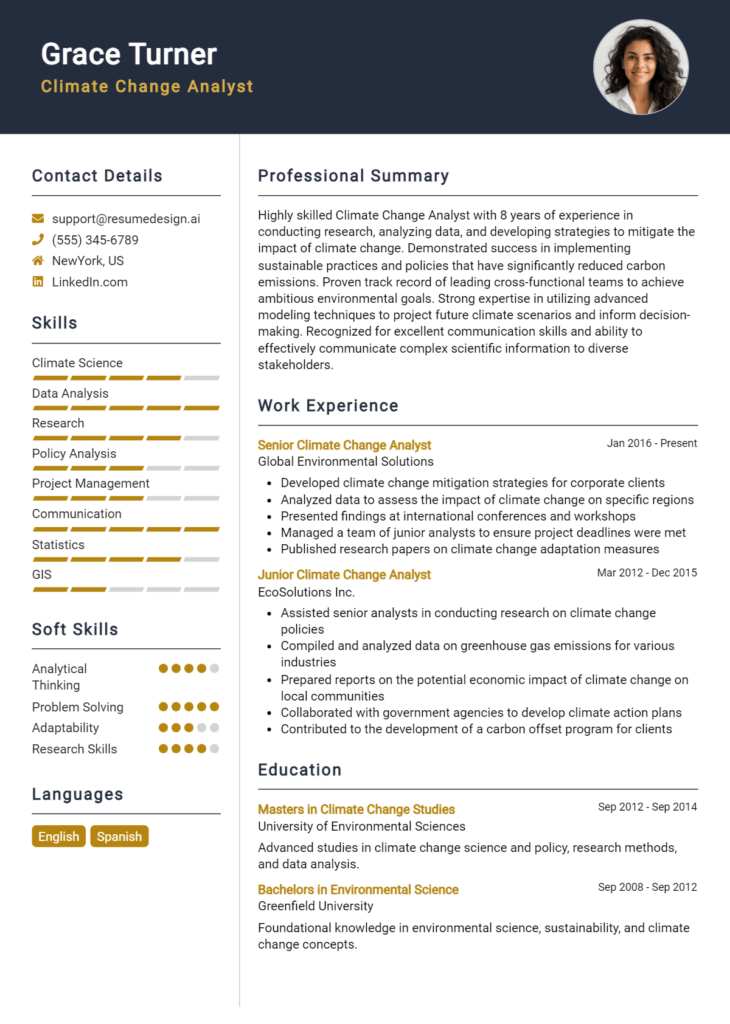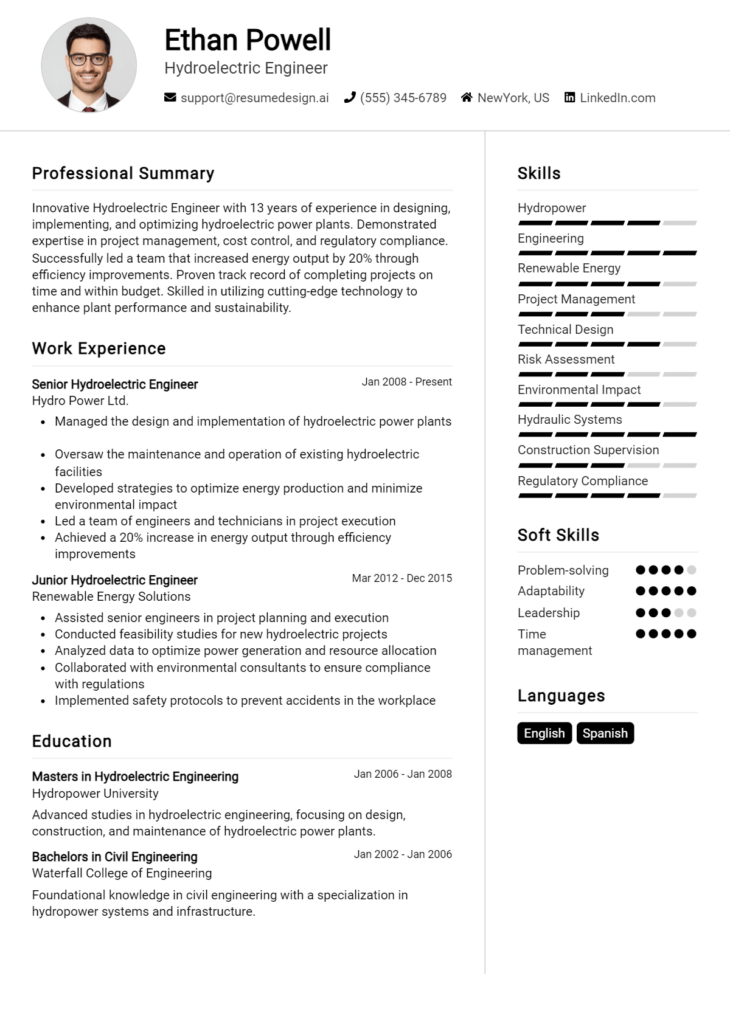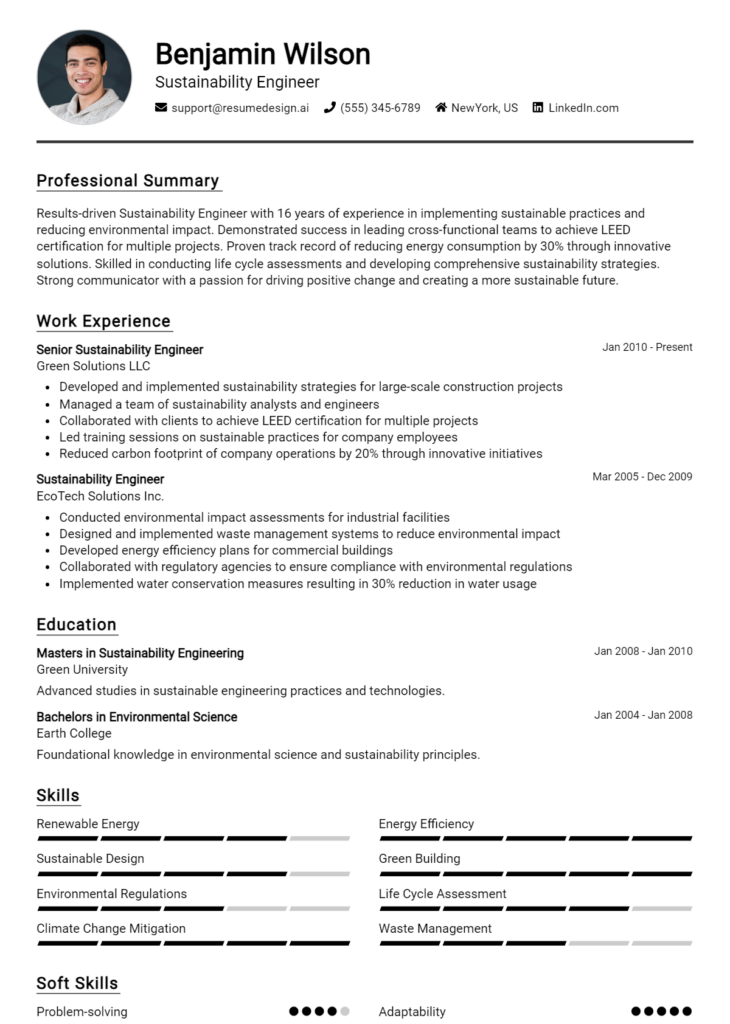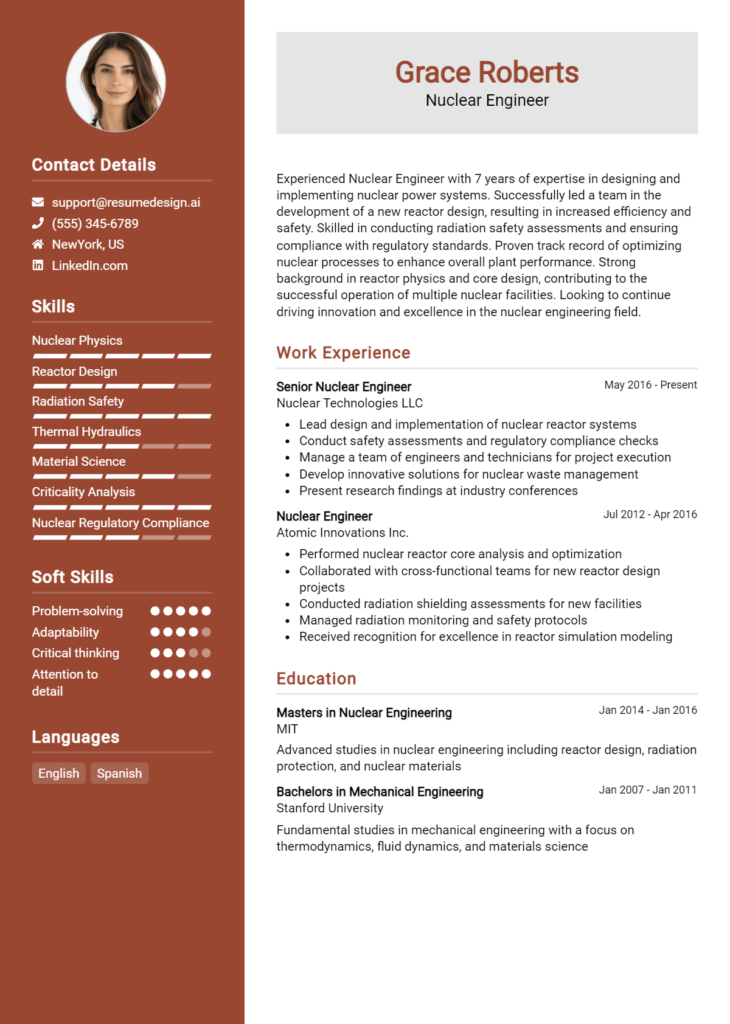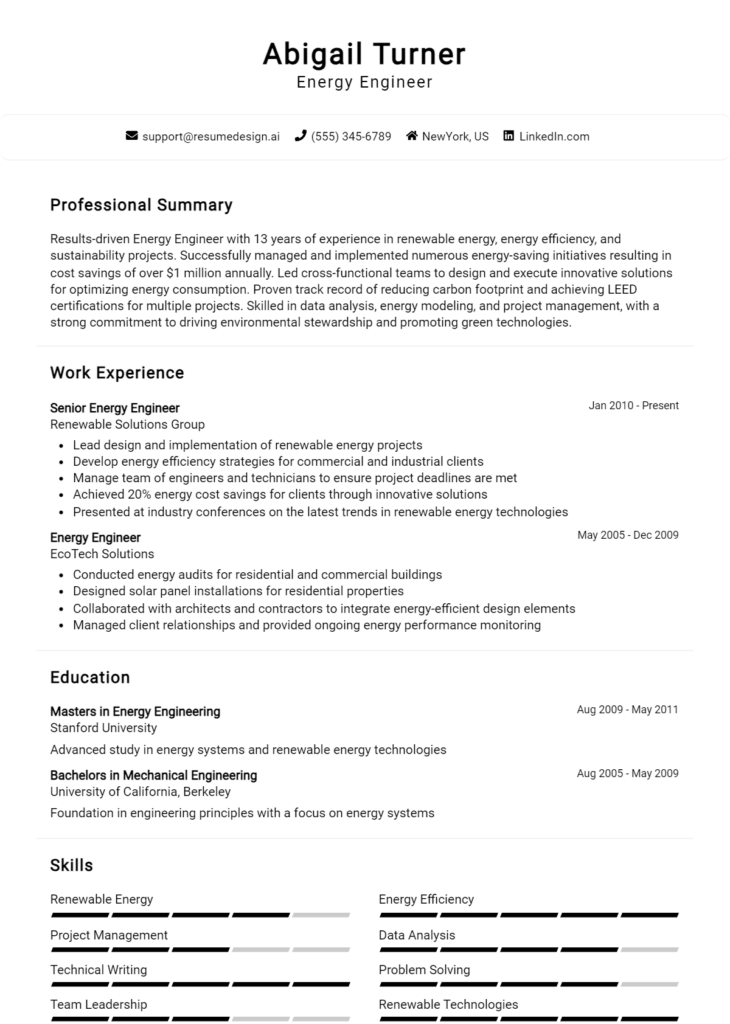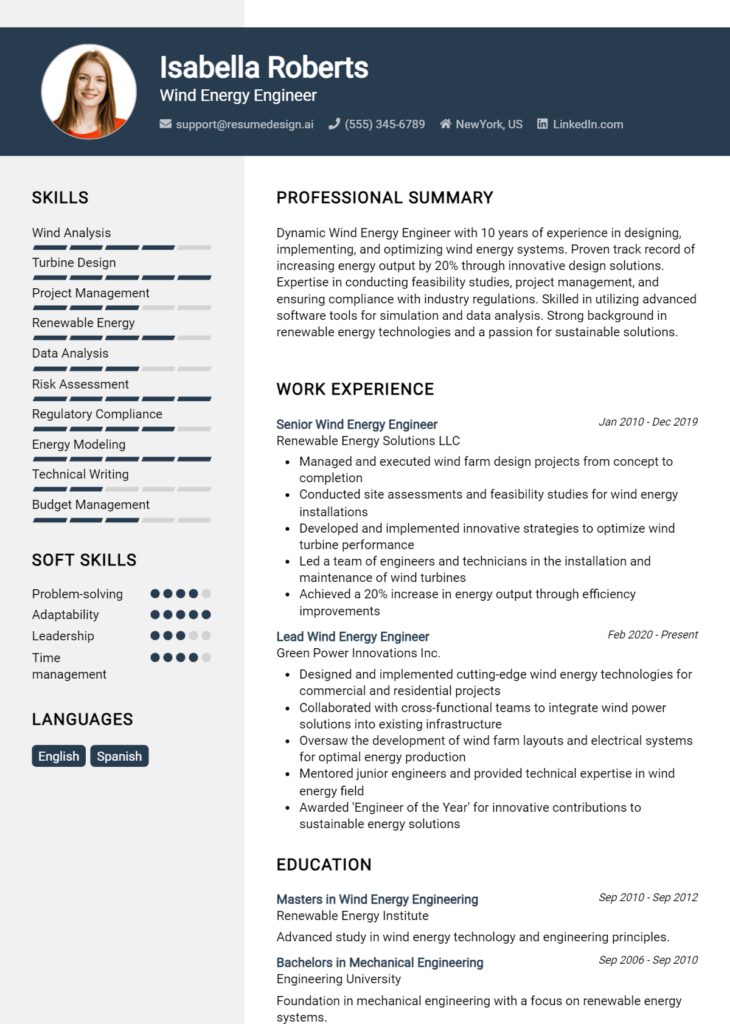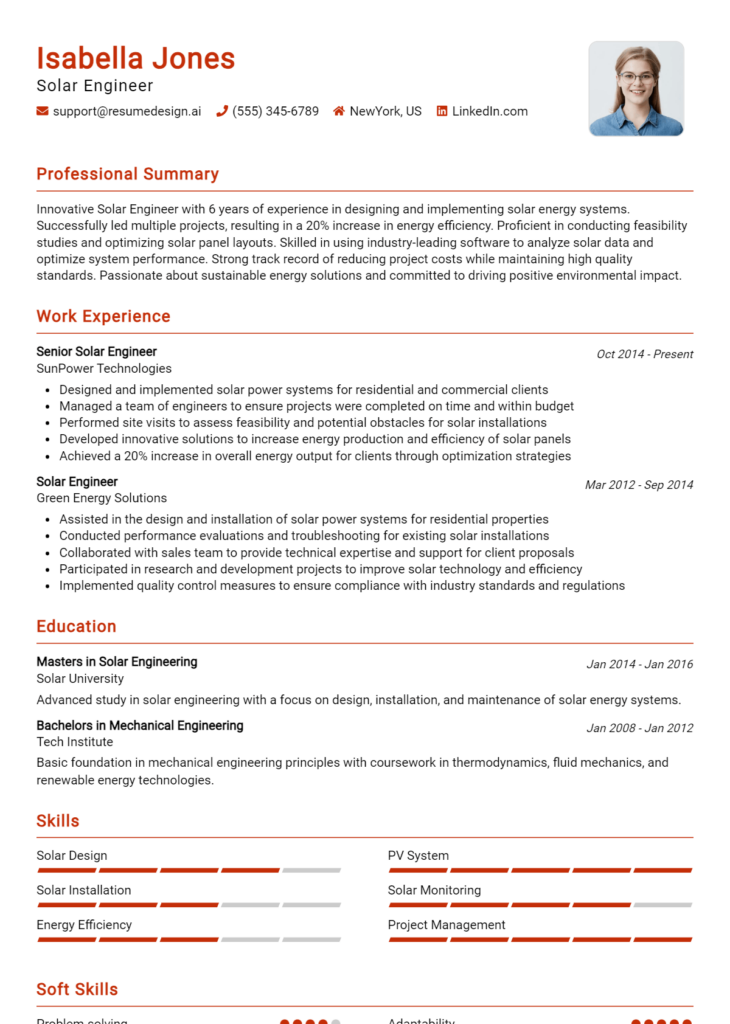Geothermal Engineer Core Responsibilities
A Geothermal Engineer plays a crucial role in the development and management of geothermal energy projects, requiring a blend of technical, operational, and problem-solving skills. This professional collaborates across departments, including geology, engineering, and environmental science, to design efficient systems for harnessing geothermal resources. Strong analytical abilities and a deep understanding of heat transfer processes are essential for addressing challenges in project implementation. A well-structured resume highlighting these qualifications can significantly enhance career opportunities and contribute to the organization’s sustainable energy goals.
Common Responsibilities Listed on Geothermal Engineer Resume
- Conduct feasibility studies for geothermal energy projects.
- Design and optimize geothermal power plant systems.
- Analyze geological data to identify suitable geothermal sites.
- Collaborate with cross-functional teams to ensure project success.
- Monitor and evaluate the performance of geothermal systems.
- Develop and implement maintenance protocols for geothermal facilities.
- Perform thermodynamic and fluid dynamics analyses.
- Prepare technical reports and presentations for stakeholders.
- Ensure compliance with environmental regulations and standards.
- Research and develop innovative geothermal technologies.
- Provide technical support during project execution and operation.
- Train and mentor junior engineers and technical staff.
High-Level Resume Tips for Geothermal Engineer Professionals
In today's competitive job market, a well-crafted resume is essential for Geothermal Engineer professionals seeking to make a lasting impression on potential employers. Your resume is often the first opportunity to showcase your skills, experience, and achievements, serving as a powerful marketing tool that opens doors to interviews and opportunities. For a field as specialized as geothermal engineering, it’s crucial that your resume not only highlights your technical abilities but also emphasizes your contributions to past projects and your understanding of industry trends. This guide will provide practical and actionable resume tips specifically tailored for Geothermal Engineer professionals, ensuring that your application stands out in a crowded field.
Top Resume Tips for Geothermal Engineer Professionals
- Tailor your resume to align with the job description, using keywords and phrases that reflect the specific requirements of the position.
- Highlight relevant experience, focusing on projects related to geothermal energy, including design, implementation, and analysis.
- Quantify your achievements by including metrics, such as energy savings, project budgets, and timelines, to demonstrate the impact of your work.
- Showcase industry-specific skills, such as knowledge of geothermal systems, thermodynamics, and subsurface exploration techniques.
- Include certifications and training relevant to geothermal engineering, such as geothermal heat pump installation or energy auditing.
- Utilize a clean and professional format that enhances readability and makes important information easy to find.
- Incorporate a summary or objective statement that clearly communicates your career goals and what you bring to the table as a geothermal engineer.
- Emphasize collaboration and communication skills, as working with multidisciplinary teams is common in engineering projects.
- List any publications or presentations related to geothermal technology, showcasing your commitment to the field and ongoing professional development.
By implementing these tips, you can significantly enhance your resume and increase your chances of landing a job in the Geothermal Engineer field. A polished and tailored resume reflects not only your technical expertise but also your dedication to the profession, making you a compelling candidate for potential employers.
Why Resume Headlines & Titles are Important for Geothermal Engineer
In the competitive field of geothermal engineering, a well-crafted resume headline or title can serve as a powerful first impression for job seekers. This brief but impactful phrase not only grabs the attention of hiring managers but also succinctly summarizes a candidate's key qualifications and aspirations. A strong resume headline should be concise, relevant, and directly related to the specific position being applied for, ensuring that it resonates with the employer's needs and expectations. In a field where expertise and experience are paramount, the right headline can set the tone for the rest of the resume, making it a crucial element of the job application process.
Best Practices for Crafting Resume Headlines for Geothermal Engineer
- Keep it concise: Aim for a headline that is no longer than 10-12 words.
- Be specific: Include relevant keywords that reflect your skills and experience in geothermal engineering.
- Highlight key qualifications: Focus on your most impressive achievements or certifications related to geothermal engineering.
- Use active language: Choose strong action verbs that convey your expertise and accomplishments.
- Tailor to the job: Customize your headline for each application to align with the job description.
- Showcase your unique value: Communicate what sets you apart from other candidates in the geothermal engineering field.
- Avoid jargon: Use clear and straightforward language that can be easily understood by hiring managers.
- Make it compelling: Create a sense of urgency or importance to motivate the reader to continue reviewing your resume.
Example Resume Headlines for Geothermal Engineer
Strong Resume Headlines
Accomplished Geothermal Engineer with 10+ Years of Experience in Renewable Energy Solutions
Certified Geothermal Systems Designer Specializing in Efficient Energy Production
Innovative Geothermal Engineer Focused on Sustainable Resource Management and Development
Weak Resume Headlines
Engineer Looking for Job
Geothermal Engineer with Experience
The strong resume headlines are effective because they immediately communicate the candidate’s expertise, experience, and unique qualifications in geothermal engineering, making it clear why they would be a valuable addition to any team. In contrast, the weak headlines fail to impress as they lack specificity and do not highlight the candidate's strengths or align with the job requirements, leaving hiring managers with little reason to take further interest.
Writing an Exceptional Geothermal Engineer Resume Summary
A well-crafted resume summary is a critical component for a Geothermal Engineer, as it serves as the first impression to potential employers. This concise overview quickly captures the attention of hiring managers by highlighting key skills, relevant experience, and notable accomplishments that align with the job role. A strong summary not only showcases the candidate's expertise in geothermal energy systems, resource assessment, and project management but also communicates their passion for sustainable energy solutions. It should be impactful, tailored to the specific job description, and effectively set the stage for the rest of the resume.
Best Practices for Writing a Geothermal Engineer Resume Summary
- Quantify achievements: Use numbers and metrics to demonstrate your impact, such as energy savings or project costs.
- Focus on relevant skills: Highlight technical and soft skills that are directly related to geothermal engineering.
- Tailor for the job description: Customize your summary to reflect the specific requirements and responsibilities of the job you are applying for.
- Keep it concise: Aim for 2-4 sentences that clearly convey your value without overwhelming the reader.
- Use action verbs: Start sentences with strong action verbs to convey a sense of proactivity and achievement.
- Highlight certifications and education: Mention any relevant degrees or certifications that enhance your qualifications.
- Showcase industry knowledge: Include specific knowledge of geothermal technologies and trends that relate to the position.
- Emphasize teamwork and collaboration: Highlight your ability to work effectively in team settings, especially in multidisciplinary projects.
Example Geothermal Engineer Resume Summaries
Strong Resume Summaries
Results-driven Geothermal Engineer with over 8 years of experience in designing and implementing geothermal energy systems, achieving a 30% reduction in operational costs for major projects. Proficient in resource assessment, system modeling, and project management, with a proven track record of delivering projects on time and within budget.
Detail-oriented Geothermal Engineer with a Master’s degree in Renewable Energy and 5 years of experience in geothermal resource exploration and development. Successfully led a team that increased energy efficiency by 25%, contributing to a significant reduction in carbon emissions.
Innovative Geothermal Engineer skilled in advanced geothermal modeling and data analysis, with expertise in utilizing software like GeoStudio and MODFLOW. Developed and executed a geothermal pilot project that generated 1.5 MW of clean energy, surpassing expected outcomes by 20%.
Weak Resume Summaries
Geothermal Engineer with some experience in the field. I am looking for a job where I can use my skills.
Enthusiastic engineer interested in geothermal energy. I have worked on a few projects and want to further my career.
The strong resume summaries stand out due to their specificity, quantifiable achievements, and relevance to the geothermal engineering field. They clearly outline the candidate's skills and successes, making them memorable and impactful. In contrast, the weak summaries lack detail, fail to demonstrate measurable outcomes, and come across as overly generic, which diminishes their effectiveness in capturing a hiring manager's attention.
Work Experience Section for Geothermal Engineer Resume
The work experience section of a Geothermal Engineer resume is critical as it provides potential employers with a comprehensive view of the candidate's technical skills, leadership capabilities, and ability to deliver high-quality results in the geothermal energy sector. This section not only highlights the individual’s hands-on experience with geothermal technologies but also demonstrates their proficiency in managing teams and projects. Quantifying achievements, such as project impacts and efficiencies gained, is essential to illustrate the candidate’s value. Additionally, aligning work experiences with industry standards and expectations ensures that the candidate stands out in a competitive field.
Best Practices for Geothermal Engineer Work Experience
- Clearly articulate technical skills relevant to geothermal energy, such as reservoir engineering, drilling techniques, and energy conversion technologies.
- Quantify achievements with specific metrics, such as energy produced, cost savings, or project timelines.
- Highlight leadership and team management experience, showcasing your ability to guide multidisciplinary teams.
- Align your experience with industry standards and best practices to demonstrate your understanding of the field.
- Include specific examples of successful project completions and your role in those processes.
- Utilize action verbs to convey your contributions and impact effectively.
- Focus on collaboration with stakeholders, including government agencies, environmental groups, and local communities.
- Customize your work experience section to match the job description of the positions you apply for.
Example Work Experiences for Geothermal Engineer
Strong Experiences
- Led a team of 10 engineers to successfully design and implement a geothermal power plant, resulting in a 30% increase in energy output and a $1.5 million reduction in operational costs annually.
- Managed a comprehensive geothermal resource assessment project that identified new drilling sites, increasing potential energy capacity by 25% over three years.
- Developed and executed a risk management plan for geothermal drilling operations, minimizing safety incidents by 40% and ensuring compliance with all regulatory standards.
- Collaborated with environmental scientists to create an innovative approach for minimizing ecological impacts, which was adopted as a best practice within the organization.
Weak Experiences
- Worked on geothermal projects that were interesting and involved various tasks.
- Assisted in the research of geothermal energy solutions.
- Participated in team meetings and discussions about project goals.
- Involved in some aspects of geothermal energy development.
The examples of strong experiences are considered effective because they clearly showcase specific achievements, quantifiable results, and leadership roles within projects, demonstrating the candidate’s expertise and impact on their work environment. In contrast, the weak experiences lack detail, specificity, and measurable outcomes, making them less compelling and failing to convey the candidate's true capabilities in the field of geothermal engineering.
Education and Certifications Section for Geothermal Engineer Resume
The education and certifications section of a Geothermal Engineer resume is crucial in establishing the candidate's qualifications and expertise in the field. This section not only highlights the academic background of the applicant but also showcases relevant industry certifications and ongoing learning efforts that are vital in this rapidly evolving sector. By detailing pertinent coursework, specialized training, and recognized certifications, candidates can significantly enhance their credibility and demonstrate their alignment with the specific requirements of the job role, making them more appealing to potential employers.
Best Practices for Geothermal Engineer Education and Certifications
- Include degrees from accredited institutions that are directly relevant to geothermal engineering.
- List industry-recognized certifications, such as those from the Geothermal Resources Council or similar organizations.
- Highlight relevant coursework that pertains specifically to geothermal systems, energy resources, and thermodynamics.
- Emphasize any specialized training or workshops attended, particularly those focused on new technologies or methodologies in geothermal energy.
- Present certifications in a clear, chronological order to demonstrate a commitment to continuous professional development.
- Use specific terminology and keywords from the job description to align your qualifications with employer expectations.
- Include any relevant research projects or academic achievements that showcase your expertise in geothermal engineering.
- Ensure that all listed credentials are current and valid to avoid any perceptions of obsolescence.
Example Education and Certifications for Geothermal Engineer
Strong Examples
- M.S. in Geothermal Energy Engineering, University of California, Davis (2021)
- Certified Geothermal Professional (CGP), Geothermal Resources Council (2022)
- Coursework: Advanced Geothermal System Design, Thermodynamics of Geothermal Energy, and Reservoir Engineering.
- Completed a specialized training program in Enhanced Geothermal Systems (EGS) at Stanford University (2023).
Weak Examples
- Bachelor of Arts in Environmental Studies, University of Florida (2015)
- Certification in Basic Plumbing from a local trade school (2016)
- Coursework: Introduction to Renewable Energy, which lacks focus on geothermal specifics.
- Outdated certification in Solar Energy Technology (2018) that does not align with current geothermal practices.
The strong examples listed demonstrate a clear focus on geothermal engineering, showcasing relevant degrees, certifications, and specialized training that align with industry standards. In contrast, the weak examples reflect qualifications that are either outdated or not aligned with the specific requirements of a Geothermal Engineer role, which could raise concerns about the candidate's preparedness for the position.
Top Skills & Keywords for Geothermal Engineer Resume
In the competitive field of geothermal engineering, showcasing the right skills on your resume is crucial to stand out among other candidates. A well-crafted resume that highlights both hard and soft skills not only reflects your technical expertise but also demonstrates your ability to work effectively in collaborative environments. Employers seek engineers who can not only solve complex technical problems but also communicate effectively with team members and stakeholders. Therefore, understanding the key skills required in geothermal engineering can significantly enhance your resume and increase your chances of landing the desired position.
Top Hard & Soft Skills for Geothermal Engineer
Soft Skills
- Communication
- Teamwork
- Problem-solving
- Adaptability
- Time management
- Critical thinking
- Leadership
- Attention to detail
- Project management
- Creativity
Hard Skills
- Geothermal system design
- Thermodynamics
- Fluid mechanics
- Geology and geophysics
- Data analysis
- Computer-aided design (CAD) software
- Energy modeling software
- Environmental impact assessment
- Well drilling techniques
- Knowledge of regulatory compliance
By incorporating these skills into your resume, you can create a comprehensive representation of your qualifications. Additionally, it is essential to complement these skills with relevant work experience to demonstrate your practical application of knowledge in real-world scenarios.
Stand Out with a Winning Geothermal Engineer Cover Letter
As a passionate Geothermal Engineer with over five years of experience in the renewable energy sector, I am excited to apply for the position at [Company Name]. My background in geothermal system design, project management, and energy efficiency positions me as an ideal candidate to contribute effectively to your team. I am particularly drawn to [Company Name] because of its commitment to sustainable energy solutions and innovative approach to harnessing geothermal resources.
During my previous role at [Previous Company Name], I successfully led a team in the design and implementation of a geothermal heat pump installation that reduced energy consumption by 30% for a large commercial client. My expertise in conducting site assessments, resource evaluation, and feasibility studies has equipped me with the necessary skills to identify optimal geothermal solutions tailored to specific project requirements. I am adept at collaborating with cross-functional teams and stakeholders to ensure projects are completed on time and within budget, while also adhering to environmental regulations.
I am particularly impressed by [Company Name]'s recent projects in enhancing geothermal energy accessibility in underserved communities. I am eager to bring my technical skills and passion for renewable energy to contribute to initiatives that not only promote sustainability but also create positive social impact. I believe that my proactive approach to problem-solving and my commitment to continuous learning will make me a valuable addition to your team.
Thank you for considering my application. I look forward to the opportunity to discuss how my skills and experiences align with the goals of [Company Name]. I am eager to contribute to your mission of advancing geothermal energy solutions and to work alongside a talented team dedicated to making a difference in the energy landscape.
Common Mistakes to Avoid in a Geothermal Engineer Resume
When crafting a resume as a Geothermal Engineer, it’s essential to present your skills and experiences effectively to stand out in a competitive job market. However, many applicants make common mistakes that can undermine their chances of landing an interview. Avoiding these pitfalls can significantly enhance the clarity and impact of your resume, showcasing your qualifications and expertise in the geothermal energy sector.
Neglecting Keywords: Failing to include relevant industry-specific keywords can result in your resume being overlooked by applicant tracking systems (ATS) that employers use to filter candidates.
Overloading with Technical Jargon: While technical knowledge is crucial, using excessive jargon without clear explanations can confuse hiring managers who may not have a technical background.
Lack of Quantifiable Achievements: Stating responsibilities without quantifying achievements diminishes the impact of your contributions. Use metrics and examples to highlight your successes.
One-Size-Fits-All Approach: Sending the same resume to multiple employers can be detrimental. Tailoring your resume for each position by emphasizing relevant experience demonstrates genuine interest and suitability.
Ignoring Soft Skills: Focusing solely on technical skills neglects the importance of soft skills such as teamwork, communication, and problem-solving, which are vital in collaborative engineering environments.
Inadequate Formatting: A cluttered or overly complicated layout can make it difficult for recruiters to read your resume. Aim for a clean, professional format that highlights key information effectively.
Omitting Continuing Education: The geothermal field is constantly evolving. Failing to include relevant certifications, courses, or training can give the impression that you are not committed to professional growth.
Not Proofreading: Spelling and grammatical errors can create a negative impression. Always proofread your resume to ensure it is polished and free of mistakes.
Conclusion
As we explored the role of a Geothermal Engineer, we highlighted the essential skills and qualifications necessary for success in this field. From a deep understanding of geothermal systems to expertise in project management and environmental regulations, the multifaceted nature of this profession demands a well-rounded skill set. We also discussed the importance of staying updated with the latest technologies and methodologies to effectively harness geothermal energy.
In conclusion, if you are aiming to excel as a Geothermal Engineer, it's crucial to present your qualifications and experiences effectively. Now is the perfect time to review your Geothermal Engineer resume to ensure it showcases your strengths and aligns with the expectations of potential employers.
To facilitate this process, make use of a variety of resources available to you. Consider utilizing resume templates to create a polished document that highlights your unique qualifications. For a more tailored approach, try the resume builder that guides you step-by-step in crafting a standout resume. Additionally, refer to resume examples to gain inspiration from successful professionals in your field. And don't forget to complement your resume with an impactful introduction using our cover letter templates.
Take the initiative today to refine your resume and position yourself as a top candidate in the geothermal engineering sector!

